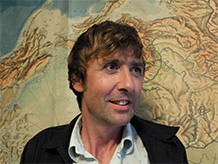Oliver Craig
Deputy Head of Department, Professor of Archaeological Science
Visit Oliver Craig's profile on the York Research Database to:
- See a full list of publications
- Browse activities and projects
- Explore connections, collaborators, related work and more
Profile
Biography
Oliver obtained his first degree in Biochemistry and Genetics (Nottingham), an MSc in Osteology, Palaeopathology and Funerary Archaeology (Sheffield), followed by a PhD in Organic Geochemistry at Newcastle. Following the competition of several post-docs, he left Newcastle in 2003 and undertook a Marie Curie Fellowship at the University of Rome II, 'Tor Vergata' where he worked on ancient DNA. Oliver was appointed at York in 2007 and became Professor of Archaeological Science in 2016. In 2020, Oliver was awarded a JSPS visiting professorship at the Nara National Research Institute for Cultural Properties in Japan. He also is an honorary researcher at the British Museum.
He currently directs the BioArCh facility, a centre of excellence in Bioarchaeology and leads BIOARC-HS, part of the UK’s Research Infrastructure for Conservation and Heritage Science (RICHeS).
Departmental roles
- Director of BioArCh
- Deputy Head of Department
- Chair Department Research Committee
University roles
- Member of Faculty research committee
- Member of the University research committee
- University mentor
Research
Overview
Oliver Craig specialises in biomolecular archaeology, i.e. the recovery of proteins, lipids and DNA from ancient skeletal remains and archaeological artefacts to provide insights into past human activities. His particular interests lie in temporal transitions and variability in human diets, cuisine and subsistence practices and the impact that dietary changes had on social evolution, health and the environment.
Oliver is interested in combining a broad range of analytical techniques to study palaeodiet but particularly stable isotope analysis of human bone and organic residue analysis of food remains on ceramics. He has led on the development of compound specific isotope approaches in both these fields.
His research has focused on the analysis of materials from key prehistoric sites in the UK, Central and Eastern Europe and along the Atlantic, Baltic and Mediterranean coastlines. Oliver is also interested in Roman diet and particularly the issue of marine consumption.
Oliver has a strong interest in the earliest use of pottery from North America, Patagonia, Eastern Baltic, Siberia, Russian Far East and Japan.
Oliver has hosted 8 Marie Skłodowska-Curie fellows from a wider diversity of backgrounds and supervised 35 PhD students. He directed the Chemarch network leading 15 PhD students to investigate the chemistry and molecular biology of prehistoric artefacts.
Projects
Oliver has participated in over 30 externally funded projects which are listed here along with current projects.
Available PhD research projects
Oliver is interested in supervising research students in the following areas:
- Prehistoric diet through stable isotope analysis
- Compound specific isotope analysis
- Organic residue analysis of artefacts
- Metabolomic applications in archaeology
- Forager-farmer interactions and transitions
Supervision
Current Doctoral Supervision
- Julia Becher 1/10/21 →
- Annie Bones 1/03/25 →
- Ella Doliente 1/10/21 →
- Lizzie Hodgson 1/10/23 →
- Lucy Makinson 1/01/24 →
- Ines Nabernik Bosnjak 1/10/24 →
- Elizabeth Hicks 1/10/21 →
Completed (York)
- Marjolein Admiraal (awarded 2020)
- Manon Bondetti (awarded 2021)
- Sophy Jessica Laura Charlton 1/10/12 → 13/05/16
- Shannon Croft 1/10/13 → 24/11/17
- Cynthianne Debono Spiteri 1/10/08 → 22/02/13
- Ozge Demirci 1/10/16 → 12/02/22
- Isabella Gaffney 1/10/17 → 7/06/22
- Andrew Langley 1/10/19 → 11/04/25
- Jasmine Lundy 1/10/17 → 13/05/22
- William Marsh 1/01/20 → 11/08/23
- Rachelle Martyn 1/10/14 → 8/08/19
- Javier Montalvo Cabrera 1/10/19 → 30/08/24
- Harry Kenneth Robson 1/10/11 → 23/10/15
- Hayley Saul 1/10/10 → 13/10/13
- Rachel Katherine Smith 1/10/11 → 1/04/16
- Silvia Soncin 1/10/17 → 14/01/22
- Edward Standall 1/10/17 → 12/11/21
- Nienke Laura Van Doorn 1/10/08 → 3/05/13
- Helen Rachel Stokes Williams 1/10/12 → 15/06/16
- Christina Carolus, Visiting 1/10/23 → 29/02/24
- Jingchao Chen, Visiting 1/10/23 → 29/02/24
Teaching
Undergraduate
- Introduction to Archaeological Science
- Practical Skills: Biomolecular Archaeology
Postgraduate
External activities
Memberships
- Honorary research fellow Department of Scientific Research, British Museum
- Academic Associate (Sainsbury Institute for the Study of Japanese Arts and Cultures, University of East Anglia)
- Honorary fellow (Aix-Marseille Université)
- International Society of Biomolecular Archaeology (founding member and secretary, 2022-24)

Contact details

